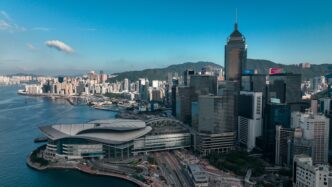Executive Summary
- Hong Kong’s Financial Secretary Paul Chan declared artificial intelligence (AI) as the key driver for the city’s next phase of economic growth and global investment attraction.
- Hong Kong plans to develop AI as a core industry, using it to upgrade traditional sectors, leveraging local universities, and integrating with the Greater Bay Area.
- The city is actively attracting AI enterprises and talent through incentive schemes, funding programs like the Hong Kong Investment Corporation, and the AI Talent Connect initiative.
The Story So Far
- Hong Kong’s Financial Secretary, Paul Chan Mo-po, has identified artificial intelligence as the crucial driver for the city’s next phase of economic growth and global investment attraction, prompting a strategic push to position Hong Kong as a leading hub for AI innovation. To realize this vision, the city plans to foster AI as a core industry by leveraging its strong academic institutions and integrating with the broader Greater Bay Area, while actively attracting global AI enterprises and talent through dedicated incentive schemes and funding programs.
Why This Matters
- Hong Kong’s strategic pivot to establish AI as its next economic growth engine signals a concerted effort to attract global investment and talent, which could significantly transform its traditional sectors and strengthen its position as a leading technology hub in Asia, contingent on the success of its government-backed initiatives and integration with the Greater Bay Area.
Who Thinks What?
- Hong Kong’s Financial Secretary, Paul Chan Mo-po, asserts that artificial intelligence (AI) is vital for the city’s future economic growth and global investment attraction, viewing it as a powerful enabler across sectors and a core industry for development.
Hong Kong’s Financial Secretary, Paul Chan Mo-po, declared on Wednesday that artificial intelligence (AI) is poised to drive the city’s next phase of economic growth and global investment attraction. Speaking at the Global Financial Leaders’ Investment Summit, Chan highlighted Hong Kong’s strategic position in terms of talent and innovation, urging international investors to consider the city as a prime destination for AI-related ventures.
AI as an Economic Enabler
Chan emphasized that global private capital investment in AI has already surpassed US$190 billion this year, indicating a significant structural shift. He described AI as a “powerful enabler” across various economic sectors, underscoring its transformative potential.
The Financial Secretary outlined Hong Kong’s strategy to develop AI as a core industry. This includes promoting AI as a tool to upgrade traditional sectors, leveraging the capabilities of top local universities, and integrating with the broader Greater Bay Area, which encompasses Hong Kong, Macau, and nine other southern Chinese cities.
Attracting Investment and Talent
Hong Kong has actively pursued leading AI enterprises through various incentive schemes and funding programs. The Hong Kong Investment Corporation, the government’s dedicated investment arm, has already committed capital to AI companies, including start-ups.
To bolster its AI ecosystem, the city has also launched the AI Talent Connect initiative. This program aims to attract skilled professionals and researchers from around the world to contribute to Hong Kong’s burgeoning AI sector.
Key Takeaways
Financial Secretary Paul Chan asserts that Hong Kong is strategically positioning itself to capitalize on the global AI surge, aiming to become a leading hub for innovation and investment in the field. The city plans to foster AI as a core industry and an enabler for traditional sectors, supported by government investment and initiatives to attract global talent.








